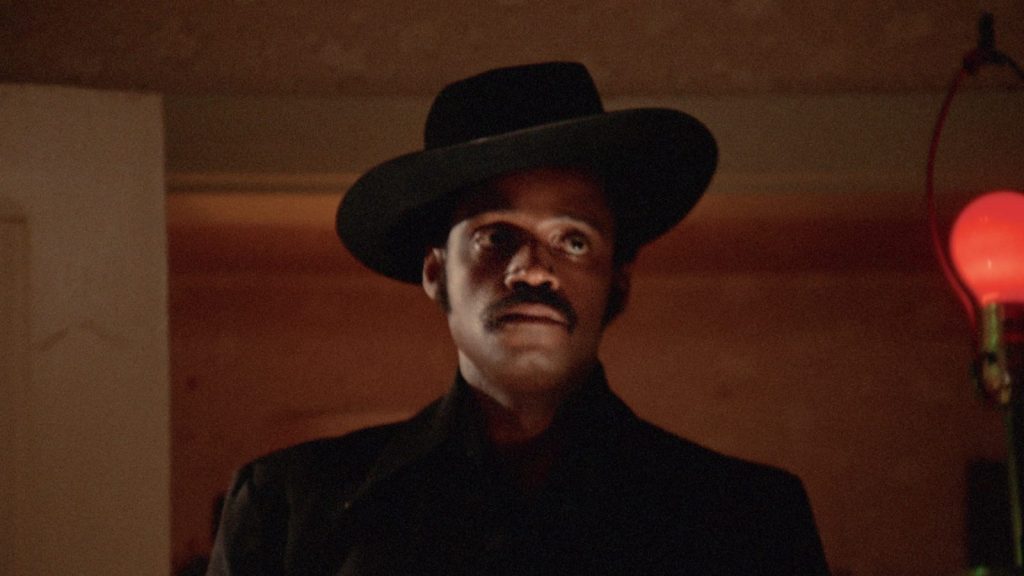Director, writer, composer, actor, and one-man creative revolutionary Melvin Van Peebles jolted American independent cinema to new life with his explosive stylistic energy and unfiltered expression of Black consciousness. Though he undeniably altered the course of film history with the anarchic Sweet Sweetback’s Baadasssss Song, that pop-culture bombshell is just one piece of a remarkably varied career that has also encompassed forays into European art cinema (The Story of a Three Day Pass), mainstream Hollywood comedy (Watermelon Man), and Broadway musicals (Don’t Play Us Cheap). Each facet of Van Peebles’s renegade genius is on display in this collection of four films, a tribute to a transformative artist whose caustic social observation, radical formal innovation, and uncompromising vision established a new cinematic model for Black creative independence. Also included in the set is Baadasssss!, a chronicle of the production of Sweet Sweetback made by Van Peebles’s son Mario Van Peebles—and starring the younger Van Peebles as Melvin.
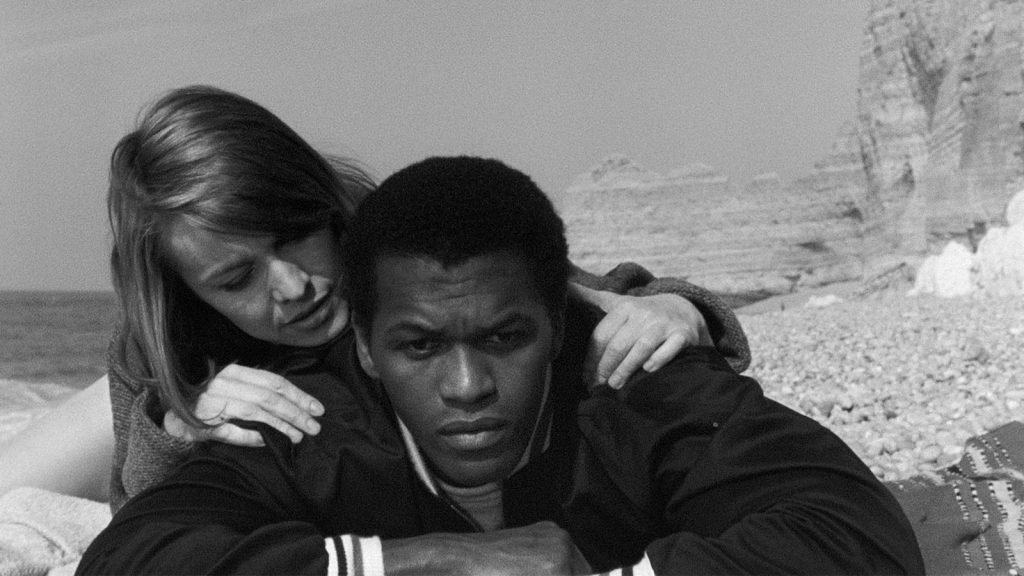
The Story Of A Three Day Pass (1967)
Melvin Van Peebles’s edgy, angsty, romantic first feature could never have been made in America. Unable to break into segregated Hollywood, Van Peebles decamped to France, taught himself the language, and wrote a number of books in French, one of which, La permission, would become the stylistically innovative The Story of a Three Day Pass. Turner (Harry Baird), an African American soldier stationed in France, is granted a promotion and a three-day leave from base by his casually racist commanding officer and heads to Paris, where he finds whirlwind romance with a white woman (Nicole Berger)—but what happens to their love when his furlough is over? Channeling the brash exuberance of the French New Wave, Van Peebles creates an exploration of the psychology of an interracial relationship as well as a commentary on France’s contradictory attitudes about race that is playful, sarcastic, and stingingly subversive by turns, and that laid the foundation for the scorched-earth cinematic revolution he would let loose just a few years later.
The Story Of A Three Day Pass should not be considered a radical movie. The film is a love story, but the obstacles that the couple in the film face are the same ones that were being faced by Van Peebles as he was trying to break into Hollywood. Equality should be the most basic right we should be able to give to another, but both at the time this film was made and even today it is a struggle. There is nothing particularly extraordinary about the love between Turner and Miriam except what society places upon them; the year this film was released was the same year the US Supreme Court struck down laws banning interracial marriages. These two ordinary people deserve an ordinary romance with flaws and all. The initial chemistry between the two is endearingly sweet; the two might stumble over language barriers and misunderstandings, but you can feel the two slowly falling for one another in a way that warms the soul.
The state of their race cannot be denied, though. Van Peebles weaves in Turner’s inner-conflict quite brilliantly from the very opening of the film with inventive techniques. By having Turner talk to his subconscious directly in the mirror, we are given unfiltered insight into all of the darkest doubts and anxieties in his mind. Such unvarnished self-criticism is key to understanding all the complex mental math that a person of color has to do just to be “normal.” The comparison of these self-images to racial stereotypes are conjured to hilarious effect during the initial love scene between Turner and Miriam. He imagines himself a European nobleman going to bed with a waiting woman, while her fantasies veer towards the tribalistic captive arena. Both are outrageous cliches that are addressed and then laughed off in favor of something more realistic and pure. Through his self-proclaimed inexperience, Van Peebles injected so many inventive filmmaking techniques into his debut feature that made the film as stylistically thrilling as it is narratively daring. It just should not have had to be narratively daring. It is a beautiful, frustrating and heartbreaking story that ranks among the most tender of Van Peebles’ career.
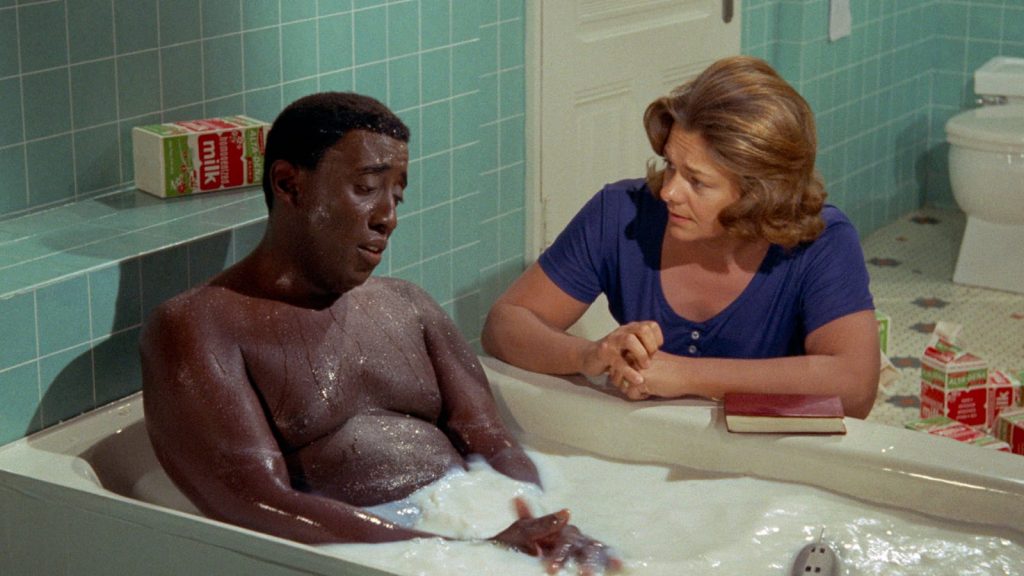
Watermelon Man (1970)
Melvin Van Peebles’s only foray into Hollywood filmmaking, Watermelon Man is one of the most audacious, radically conceived works to be financed by a major American studio in the 1970s. Comedian Godfrey Cambridge delivers a virtuoso performance (initially in whiteface) as Jeff Gerber, a loudmouthed, bigoted white insurance salesman whose sitcomlike suburban existence is jarringly upended when he wakes up to discover, in a wild spin on Franz Kafka’s The Metamorphosis, that he has become a Black man. What ensues is a ferocious satire of society’s racist double standards that gradually transforms into an empowering portrait of awakening Black consciousness, executed with a mix of acerbic irreverence and deadly serious political commentary by a relentlessly subversive Van Peebles.
Thank god for Melvin Van Peebles. It should come as no surprise that Hollywood initially thought it would be a good idea to tell this story with a White actor who would act in black face after the “transformation” happens. What would almost assuredly be a film that would be buried deep in some studio vault these days was instead salvaged by Van Peebles and shaped into a biting social satire that made the most of Van Peebles’ lone foray into the Hollywood system. The film is set up perfectly using the wholesome sitcom aesthetic as the privileged white insurance salesman Jeff Gerber is shown to be so comfortable in his suburban existence that he literally races the bus on foot every morning just to inject some excitement into his life. Watching the great Godfrey Cambridge tackle the weirdness of being white adds to the idea that whiteness should not be considered the default – the mere combination of his routine and appearance is completely artificial.
His “transition” to being Black allows for Van Peebles to hold a mirror up to the non-Black members of the audience to confront some of their prejudices, either buried or not. Godfrey is superb at maintaining the bigoted Jeff persona in his “new” body. There are so many fast and cutting allusions to Black stereotypes and misguided perceptions that Van Peebles lobs at the audience only hoping the White audience members are not laughing for the wrong reasons. A recurring refrain that Jeff thinks he spent “too much time under the sun lamp” is such perfect encapsulation of this character. It is fascinating to watch Jeff go through what are essentially the stages of grief while learning more about the plight of the Black man in America which he had so freely dismissed in the past. This could have gone wrong in so many different ways, but Van Peebles manipulated the studio into making the uncompromising movie he wanted to make. Not only does he not coddle a White audience, but he also challenges the way in which Black people have been depicted on screen such as the diner worker played by Mantan Moreland. Watermelon Man is a very subversive and radical film, and the way in which it lacerates American ideals so brilliantly should not be undervalued.
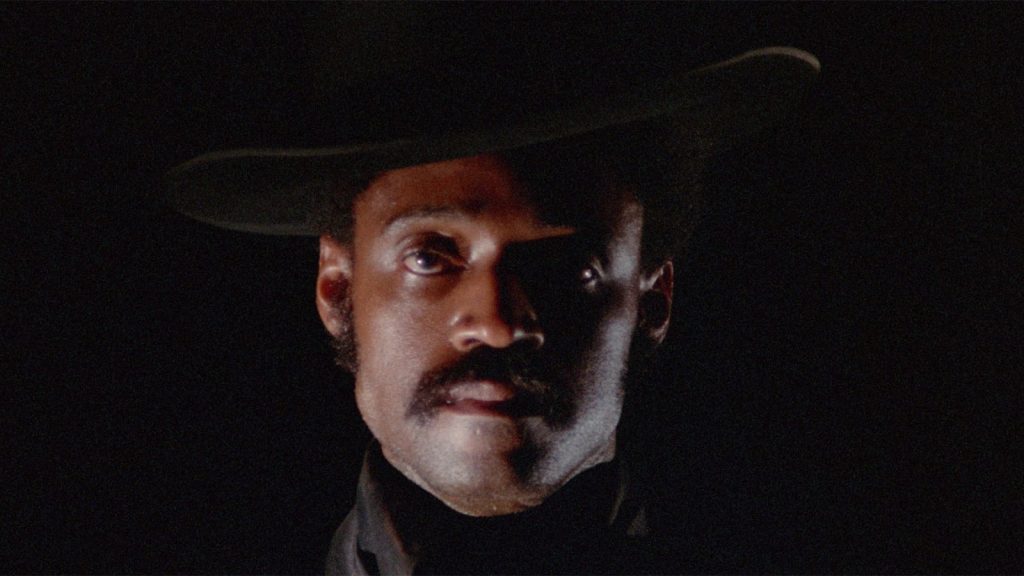
Sweetback’s Baadasssss Song (1971)
A landmark of Black and American independent cinema that would send shock waves through the culture, Sweet Sweetback’s Baadasssss Song was Melvin Van Peebles’s second feature film, after he walked away from a contract with Columbia in order to make his next film on his own terms. Acting as producer, director, writer, composer, editor, and star, Van Peebles created the prototype for what Hollywood would eventually co-opt and make into the blaxploitation hero: a taciturn, perpetually blank-faced performer in a sex show, who, when he’s pushed too far by a pair of racist cops looking to frame him for a crime he didn’t commit, goes on the run through a lawless underground of bikers, revolutionaries, sex workers, and hippies in a kill-or-be-killed quest for liberation from white oppression. Sweet Sweetback’s Baadasssss Song’s incendiary politics are matched by Van Peebles’s revolutionary style, in which jagged jump cuts, kaleidoscopic superimpositions, and psychedelic sound design come together in a sustained howl of rage and defiance.
Melvin Van Peebles had more invested in his artistic integrity than he did any potential mainstream success. After fighting over every single aspect of Watermelon Man, it makes sense that he would leave studios in the dust and make exactly what he wanted to make – what he believed the Black community needed. Sweet Sweetback’s Baadasssss Song does not care if it makes you uncomfortable. It is not for everyone, but it should be lifted up for how it revolutionized Black cinema and the landscape of independent film. If you go into the film without context, the fact that it has pornographic elements may seem jarring, but when you hear how Van Peebles needed the film to be classified as a porno to get around union regulations where he could hire a more diverse crew, even the most prudish should be understanding. The film goes against everything White mainstream media had poisoned the society with; by creating a picture free from the influence of “The Man”, Van Peebles hoped he could tip the scales towards Black audiences at least once.
As a cultural touchstone, it is unmatched. As a film, it can be a disorienting but ultimately rewarding experience. The stylistic choice to directly address the audience through bookends of text is a thrilling subversion. There is no beating around the bush about the intentions of the film from the onset, and as you walk away from the film you feel emboldened to not let anyone step on you. The character of Sweetback is mysteriously opaque, only uttering a few key sentences throughout the narrative as the voice of Van Peebles emanates from the soundtrack provided by Earth, Wind & Fire as a kind of uncensored internal voice. Sweetback never stops in his race for survival against his oppressors, and the technical presentation matches this through a consistent score and frantic editing. Van Peebles embraces runaway slave imagery to add additional impact to late-film sequences. The film has very obvious signs of the limited budget it had at its disposal, but even at its most shabby it is crackling with a creative energy that money cannot buy. While perhaps not the most poignant or most satirical film from the director, it is the one with the most passion behind it.
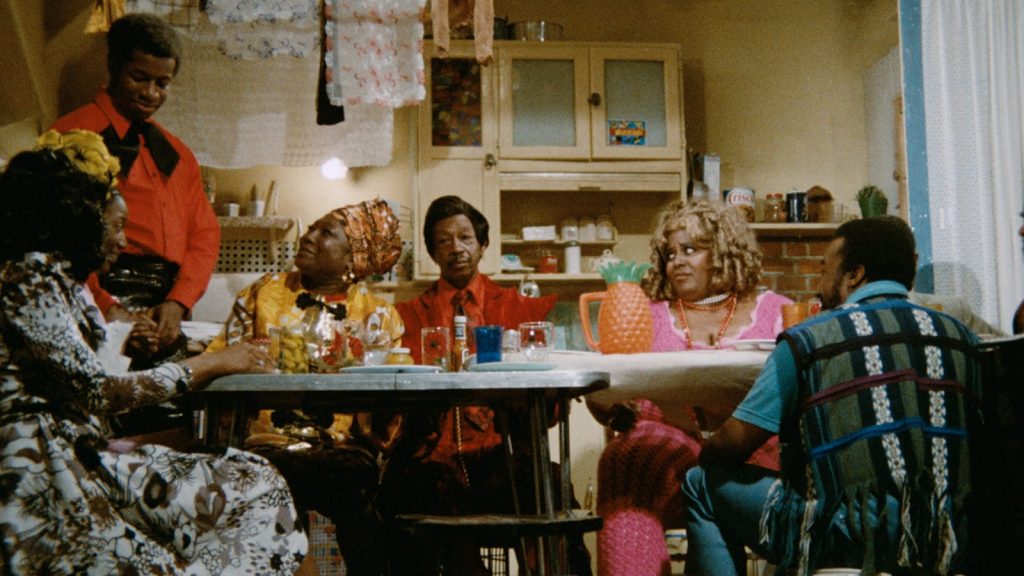
Don’t Play Us Cheap (1972)
Melvin Van Peebles’s film version of his own Tony Award–nominated Broadway musical is a bold blend of theater and nervy, New Wave–inflected cinematic invention. A cast of Black stage and screen luminaries including Esther Rolle, Mabel King, and Avon Long stars in this charmingly offbeat, fablelike fantasy in which a pair of mischief-making devil-bats dispatched by Satan assume human form in order to wreak havoc on a Saturday-night house party in Harlem—only to find their diabolical plan thwarted by their hosts’ infectious generosity of spirit. Staged with ebullience, the original blues- and gospel-infused songs by Van Peebles burst forth in a life-affirming celebration of Black joy, tenderness, resilience, and strength.
For this final film from Melvin Van Peebles included in this collection, the filmmaker dials back on the revolutionary rhetoric while maintaining his groundbreaking spirit. Don’t Play Us Cheap is not just an example of innovative Black theater, but it is notable for showcasing how much joy and hopefulness can be associated with the Black experience. Van Peebles unironically uses this narrative to show how life-changing it can be to choose love and kindness in your life. When the two devil-bats come into the party to ruin the festivities, the spirit of community is too much to be crushed by the forces of evil. Try to deplete the supply of liquor, food and music? There is always more to go around, and poverty is no excuse to exhaust generosity. There are many challenges people of color endure every day, but Van Peebles attempts to show that choosing joy is freedom. The plot is very straightforward, but the way in which it unfolds is quite moving even today.
The text itself is powerful, but Van Peebles does not rest on the impact that it has by allowing the filmmaking to suffer. As always, the intrepid filmmaker is providing maximum production value for a minimum budget. Some special effects may not be perfectly executed, but the way in which he brings to life this fantastical tale is nonetheless impressive. There are some perfectly timed jump cuts along with some dolly shots that remind you that there is some artistry behind this film besides just capturing a stage play. The performances from the ensemble does not contain a weak link in the bunch, including in the bourgeois Johnson family which underscores the inherent evilness of putting up a facade. In addition to the narrative, proper respect should be paid to the amazing songs that Van Peebles composed. “I’m A Bad Character” not only finds Trinity wrestling with his core traits, but it simultaneously works as a send-up of novelty jazz tunes. One of the most fulfilling numbers is “The Book Of Life” which engages the entire cast and feeds into the overall theme of community. This film is unlike anything else in this collection, but it is without a doubt 100% Melvin Van Peebles.

Baadasssss! (2003)
Director Mario Van Peebles chronicles the complicated production of his father Melvin’s classic 1971 film, “Sweet Sweetback’s Baadasssss Song.” Playing his father in the film, Van Peebles offers an unapologetic account of Melvin’s brash and sometimes deceptive conduct on the set of the film, including questionable antics like writing bad checks, tricking a local fire department and allowing his son, Mario, to shoot racy sex scenes at the age of 11.
With Mario Van Peebles stepping behind the camera to bring to life the production of his father’s most notorious work, this film acts as the perfect love-letter to the rebellious spirit we have come to know in these previous four films. This feature is by far the most mainstream and accessible of any of the films in this set, but it is also trying to accomplish something very different than what Melvin ever did. Functioning as both a narrative document of every logistical battle his father had to fight, as well as an exorcising of some familial baggage, the younger Van Peebles creates something that is incredibly enlightening and deeply entertaining. The decision to play his own father echoes the decision Melvin made to star in Sweetback because, who could do the material justice better? Even with Mario being so close to the material, he does prove to be objective when necessary in order to honor the voices of those who worked alongside his father on the original film.
You can read all you want about the behind-the-scenes maneuvering to make Sweetback a reality, but there is something special about watching it all unfold in front of your eyes. Seeing the stress that Melvin was under as issue after issue popped up; there is a scene late in the film where Melvin loses his eyesight from overexertion, which dovetails nicely into a poignant moment with his young son. You also get to see Melvin the creative genius, such as when he takes advantage of an ill-informed fire department to add authenticity to the picture. You know the lore behind the film, but there is still a part of you that gets nervous when Melvin takes Sweetback to premiere and you wonder if anyone will even show up. Appearing alongside Mario is a supremely talented array of actors such as Terry Crews, David Alan Grier, Nia Long and Rainn Wilson. The film is hugely entertaining, and it is topped off with great interviews with some of the real-life participants over the end credits. Not even an appearance from Bill Cosby can ruin it. Baadasssss! might not be directed by Melvin Van Peebles, but it deserves its spot in this collection.
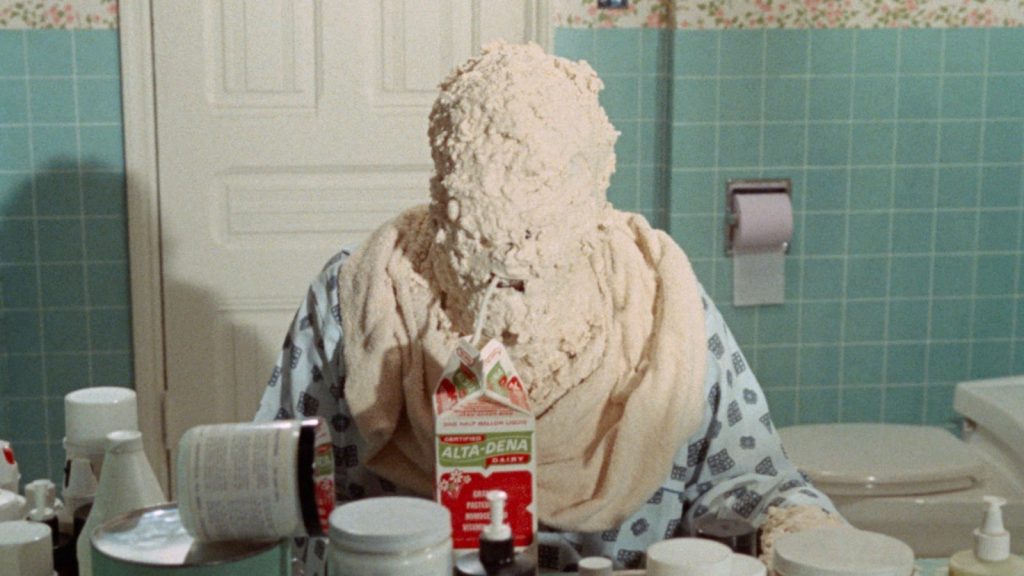
Video Quality
The Blu-Ray set of Melvin Van Peebles: Essential Films features all four Melvin Van Peebles films presented in their original aspects ratios and are sourced from new 4K digital restorations. Some elements of the films are similar and will be grouped together, but each one is so stylistically different that a lot of differences will be pointed out.
The Story Of A Three Day Pass makes its US Blu-Ray debut in its original 1.66:1 thanks to The Criterion Collection with a brand new 1080p release sourced from a 4K digital restoration of the 35mm fine grain master positive and 35mm duplicate negative. For a film that uses imagery so effectively, it is heartening to see it look so spectacular. The gorgeous black-and-white photography shot by Michel Kelber sparkles in high definition with natural grain respectfully intact. There is a fantastic amount of detail present with nice textures on the clothing, especially in the uniform of Turner. The new transfer shows off a great amount of depth and enhanced detail within the hotel room as well as exteriors like the beach and fields. Black levels are very deep with no trace of black crush, compression artifacts or other digital anomalies. The nuance in the grays is quite impressive throughout. The contrast is well defined, and there is virtually no print damage to be found. The Criterion Collection has given this one the 5-star treatment.
Watermelon Man makes its US Blu-Ray debut with a new digital AVC encoded 1080p transfer in 1.85:1 derived from a 4K restoration of the 35mm original camera negative. Similarly, Don’t Play Us Cheap debuts on Blu-Ray in 1.66:1 from a 4K restoration of the 35mm original camera negative. These presentations are as close to pristine as you could possibly get, as the new scans look quite excellent throughout the entirety of the runtime. There were no discernible instances of print damage, and overall clarity and detail is magnificent. The sitcom aesthetic of Watermelon Man is replicated well here with colors that are well saturated in a visually splendid way. Don’t Play Us Cheap has a more theatrical aesthetic that reveals some stylistic limitations, but what was captured by the camera is rendered well here. Skin tones are natural and consistent with subtle facial features easily noticeable in closeup. Black levels hold up well with virtually nothing in the way of crush and only some occasional loss of shadow detail. There does not appear to be any amount of digital noise due to compression limitations or other such nuisances. These new presentations are top-tier quality from beginning to end and should please any fan of the material.

Sweet Sweetback’s Baadasssss Song returns to Blu-Ray with a new digital AVC encoded 1080p transfer in 1.85:1 after previously being available through Vinegar Syndrome. This new master is derived from a 4K restoration of the 35mm original camera negative conducted by Vinegar Syndrome with some additional restoration done by The Criterion Collection. While I do not have the Vinegar Syndrome Blu-Ray to compare, the discs likely look nearly identical with maybe a slight edge to the Criterion Collection disc due to the additional restoration efforts. The film itself begins with an acknowledgement for why this film fares the worst out of everything in this collection. Due to the nature of how this was filmed with a variety of different formats on the fly, shots can vary in quality from scene to scene. The half of the film that was filmed on 35mm looks stellar, but the portion filmed on 16mm color reversal that was blown up to 35mm can look a bit grimy. This film employs a lot of visual effects and the blow up stock used became very unstable over the decades which has resulted in some fading and solarization for small segments of the film. While this is unfortunate, this happens sometimes when you are working with film and the restoration effort has done a valiant job of making this material look as good as possible. Within the parameters of this film that was always a bit gritty looking, the results are still quite excellent.
Baadasssss! is mostly treated like a supplemental feature in this collection, but it does at least get its own dedicated disc as it makes its Blu-Ray debut with a 1080p transfer. Unlike the main features, there are no details about the master for this film, but if I were to guess I would say it is likely an older master with no signs of wear and tear which is quite striking and represents a big step up in quality from the dated DVD. For the majority of the film, the transfer looks incredibly clear and detailed with only a couple of shots exhibiting a bit of excessive softness or overblown highlights. The transfer is naturally filmic with some impressive detail in the production design and texture of clothing. Colors stand out in a really pleasing manner with bright, vivid hues leaping off the screen in almost every scene. Black levels are pleasing in their depth with not much in the way of crush present. There are no intrusive specks of print damage present in the transfer. Overall, I was quite impressed by how strong the presentation was from beginning to end.
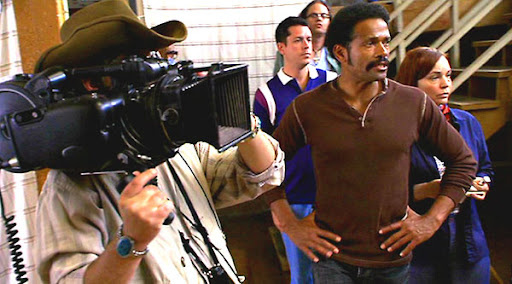
Audio Quality
These Blu-Ray discs come with The Story Of A Three Day Pass, Watermelon Man and Sweet Sweetback’s Baadasssss Song featuring a remastered LPCM 1.0 mono track with optional English subtitles. The music sounds great throughout, especially the Earth, Wind & Fire soundtrack of Sweetback which comes alive quite nicely. Van Peebles makes films that are incredibly distinct in every way, and these tracks do everything they need to ensure that dialogue comes through clearly. Environmental sounds such as crowd chatter or animal noises are rendered well alongside everything else. Don’t Play Us Cheap feels similar, but with some added separation in its DTS-HD 3.0 Master Audio track that helps this musical feel more lively. Baadasssss! comes with a DTS-HD 5.1 Master Audio track that is very pleasing and engages the surround channels thoroughly, especially with the music. There does not seem to be any majorly noticeable instances of age-related wear and tear to any of these tracks outside of some limitations from the original recording conditions. The Criterion Collection has given these films audio tracks as perfectly preserved as can be expected.
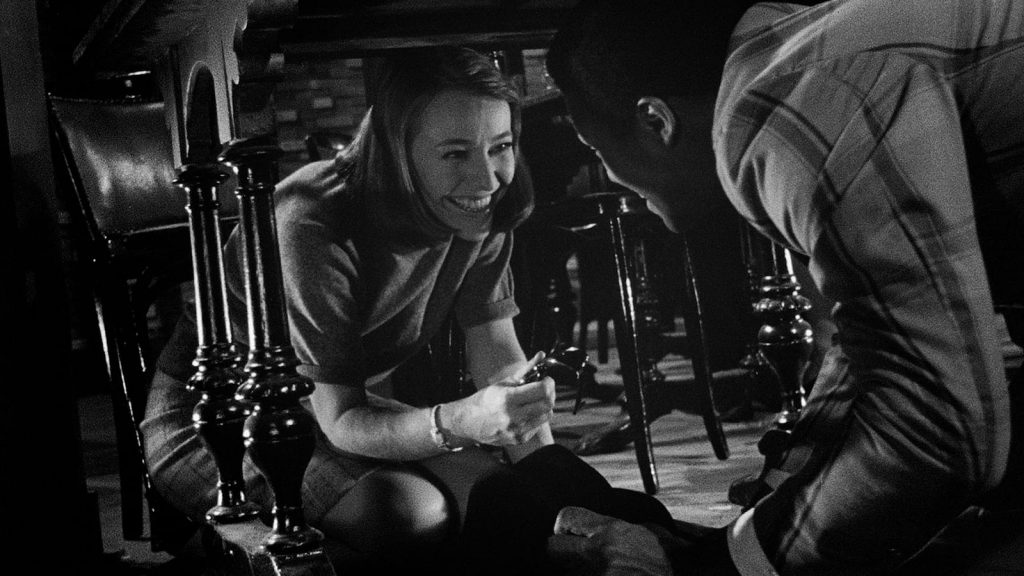
Special Features
The Criterion Blu-Ray of Melvin Van Peebles: Essential Films includes a bound booklet featuring several new essays which collectively offer an examination of Van Peebles as an artist through his evolving career along with individual explorations of each film in the greater social context. These include “Reintroducing Melvin Van Peebles” and “Watermelon Man: Melvin In Hollywoodland” by author Racquel J. Gates, “The Story Of A Three Day Pass: Ordinary Love” by author Allyson Nadia Field, “Sweet Sweetback’s Baadasssss Song: I’m Gonna Say A Black Ave Maria For You” by author Michael B. Gillespie and “Don’t Play Us Cheap: The Sacredness Of Saturday Night, Or The Gospel According To Melvin Van Peebles” by author Lisa B. Thompson. All of these provide a great amount of context and insight into these films that is so worthwhile. The on-disc special features are as follows:
The Story Of A Three Day Pass
- Introduction By Melvin Van Peebles: A three-minute introduction recorded in 1997 in which Van Peebles discusses how he came to make his first film in France and the various loopholes he exploited to get the film made.
- Pour Le Plaisir – Melvin Van Peebles: A 23-minute episode of the French show which originally aired in 1968 featuring interviews with director Melvin Van Peebles and actors Harry Baird and Nicole Berger conducted on the set of the film. This provides some biographical information on Van Peebles, delves into his work as an author, the process of adapting his story, and offers various natural moments with the filmmaker.
- Black Journal: A five-minute segment of the show Black Journal which originally aired in 1968 featuring an interview with Van Peebles in which he discusses his burgeoning career, his hope for Black filmmaking, some of the intricacies of the story and more.
- Warrington Hudlin and Nelson George: A new 21-minute interview conducted in 2021 between film producer Warrington Hudlin and music historian Nelson George in which they discuss the fierce filmmaking of Melvin Van Peebles. These two discuss how Van Peebles used his own dynamic in France to lend authenticity, the crossover appeal of Watermelon Man, the stylistic flourishes he adds to his work, the radical exploration of White supremacy in his films, thematic tissue that flows through his work, giving Black performers roles worthy of their talent and more.
- Short Films
-
- Sunlight: A ten-minute short film from 1957 about a man who commits a petty crime out of love for a lady. This one features a baby Mario Van Peebles.
-
- Three Pickup Men For Herrick: A nine-minute short from 1957 about a group of day laborers trying to compete for work.
-
- Les Cinq Cent Balles: A twelve-minute short from 1961 in which a young boy tries to retrieve some money from a gutter. This one is a simple premise, but it is well executed and stands as my favorite of the three.
- Trailer: A two-minute trailer is provided for the film.
Watermelon Man
- Introduction By Melvin Van Peebles: A five-minute audio introduction recorded in 2004 in which Van Peebles explains the path to directing Watermelon Man, the original studio ideas for the film, the ways in which he made studios nervous, his influence on the ending, how it impacted his career and more.
- How To Eat Your Watermelon In White Company (And Enjoy It): An 85-minute feature documentary from 2005 by director Joe Angio which traces the historic career of Melvin Van Peebles from The Story Of A Three Day Pass in France to his revolutionary independent filmmaking later in his career. This features many fascinating interviews with Van Peebles, his children, Spike Lee, St. Clair Bourne, Gordon Parks and many more who provide wonderful insight into the filmmaker. This is an excellent addition to the set.
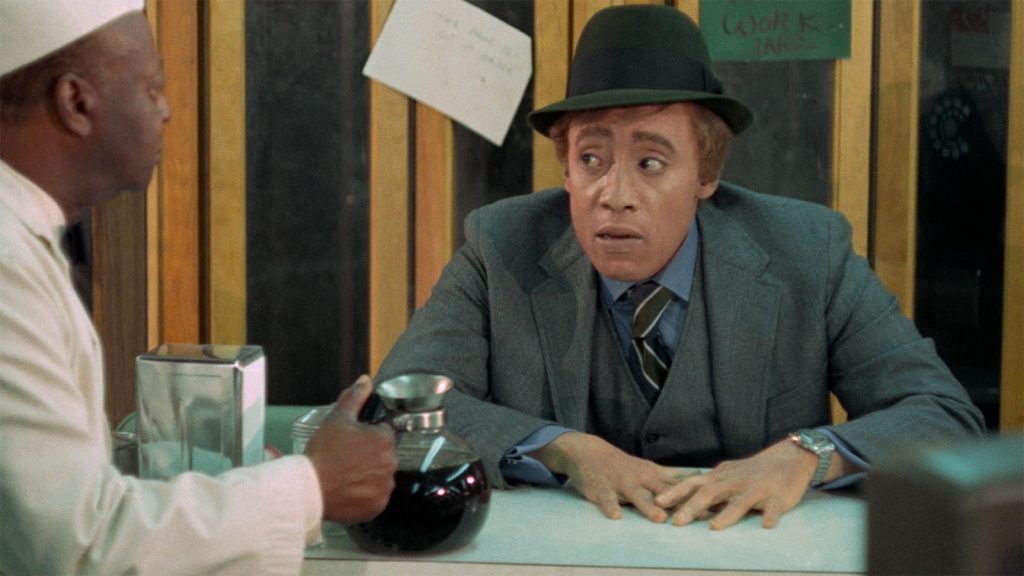
Sweetback’s Baadasssss Song
- Introduction By Melvin Van Peebles: A three-minute introduction from 1997 in which Van Peebles discusses his four goals for making Sweetback.
- Audio Commentary: Director Melvin Van Peebles provides a commentary track recorded in 1997 which delivers an immense amount of detail and background to the history of the film. There is a lot of scene-specific commentary which allows Van Peebles to recall both his inspirations and memories from production. There are also many moments where he chooses not to take himself too seriously as he points out some mistakes throughout the film.
- Mario Van Peebles and Elvis Mitchell: A nearly 24-minute new interview between film critic Elvis Mitchell and filmmaker Mario Van Peebles in which they discuss his father with lovely and entertaining anecdotes. The two discuss the various sides of Melvin, the process of bringing Black culture into the mainstream, how he interacted with studio executives, his no-BS attitude, the advice he gave as a father and more. This is one of my favorite pieces in the entire set.
- Detroit Tubeworks – Melvin Van Peebles: A 13-minute episode of the show Detroit Tubeworks which originally aired in 1971 featuring an interview with Van Peebles as he promotes the Detroit opening of the film in which he discusses the film X rating, the themes of the film, the music composed for the feature and more.
- Scholars Panel: A nearly 26-minute conversation recorded in 2021 between film scholars Amy Abugo Ongiri, Gerald R. Butters Jr., and Novotny Lawrence. This piece discusses their personal experiences with Sweetback, the place in the Blaxploitation movement, the cultural impact on Black film and beyond, the generational and ideological divide of the audience, the idea of phallic masculinity, the heightened reality of the film and much more.
- Black Journal: A 24-minute episode of the show Black Journal which originally aired in 1971 featuring an interview with Van Peebles and journalists Clayton Riley, Francis Ward and A. Peter Bailey in which they discuss the place of pornography in the film, the feelings around the film being revolutionary, the principles of Black art, the portrayal of Black women in the film and more. It is enlightening to see different sides debating the film in a thoughtful manner.
- Trailer: The two-and-a-half-minute trailer is provided here.
Don’t Play Us Cheap
- Introduction By Melvin Van Peebles: A three-minute introduction from 1997 in which Van Peebles recalls the encounter that gave him the idea for this play.
- Black Journal: A 29-minute episode of the show Black Journal which originally aired in 1972 featuring an interview with Van Peebles in which he discusses the Broadway production of Don’t Play Us Cheap, the reasons he wanted to bring this story to the stage, interpretations of the text and more. In addition to getting personal insights into the story, this piece also delivers filmed pieces from the stage production which allows you to see some of the difference in execution.
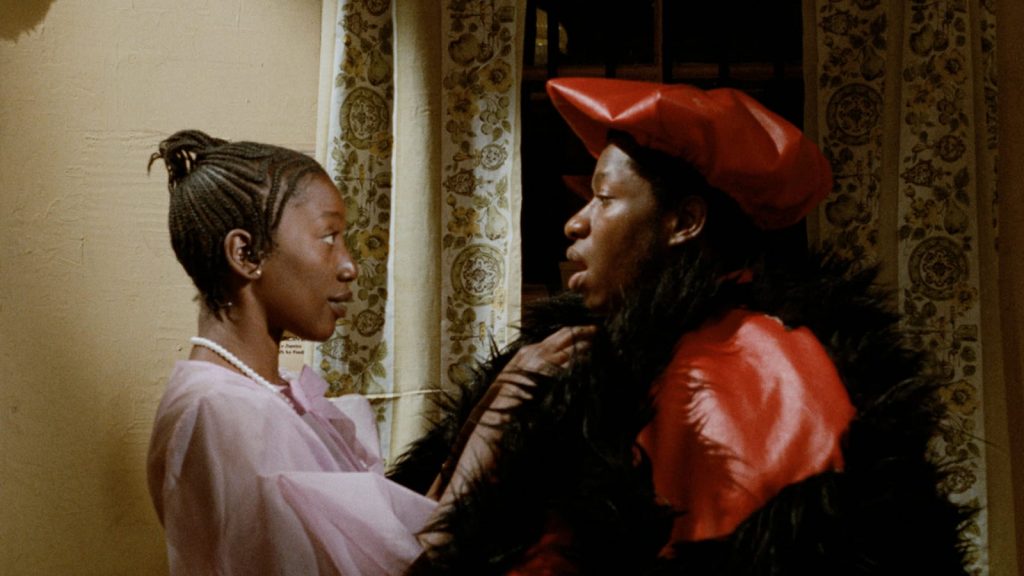
Baadasssss!
- Audio Commentary: Director Mario Van Peebles and his father Melvin Van Peebles deliver an outstanding commentary track in which they weave in the real-life details of Melvin’s life while commenting on the film and delivering further context for what we are seeing on screen. Their banter back and forth is one of the highlights of this set such as Melvin revealing that he charged his son to use clips of Sweetback in his film, the discussions over the composite nature of certain characters or events, and so much more.
- The Story Of Baadasssss! – The Birth Of Black Cinema: A 22-minute vintage featurette in which the cast and crew discuss the reasons behind making this film, the industry-shifting nature of Sweetback, bringing the real-life characters to life, the intercutting between Baadasssss! and Sweetback, using this project to connect with his father on another level and more.
- Melvin Van Peebles – The Real Deal: A 22-minute featurette filmed in 2002 in which Melvin Van Peebles guides you through Paris as he recounts making Sweetback’s Baadasssss Song.
- Visual History with Melvin Van Peebles: A nearly 45-minute interview with Melvin Van Peebles conducted by Mario Van Peebles in 2004 for the Director’s Guild Of America’s Visual History Program. In this piece, Melvin discusses his initial interest in film, getting his start in the business, finding his visual style, working as an independent filmmaker and so much more that reaffirms why he was such a powerhouse filmmaker.
Final Thoughts
The Criterion Collection release of Melvin Van Peebles: Essential Films represents one of the finest releases we will see all year. For those who do not know Melvin Van Peebles, this is an opportunity to get to know one of the most powerful voices Black cinema has ever known. For those who are already fans, this collection will allow you to delve into this material as you have never been able to before. Every single film has something special to admire about it, and the inclusion of the Mario Van Peebles film Baadasssss! feels like the perfect way to tie this set together. The Criterion Collection has provided these films with an incredible A/V presentation and more special features that you will know what to do with. If any filmmaker deserves this type of honor, it is Melvin Van Peebles. His recent passing a few weeks back is a crushing loss for cinema, and now more than ever is a time to lift up this work as groundbreaking pieces of art. Essential
Melvin Van Peebles: Essential Films is currently available to purchase on Blu-Ray.
Note: Images presented in this review are not reflective of the image quality of the Blu-Ray.
Disclaimer: The Criterion Collection has supplied a copy of this set free of charge for review purposes. All opinions in this review are the honest reactions of the author.

Dillon is most comfortable sitting around in a theatre all day watching both big budget and independent movies.


